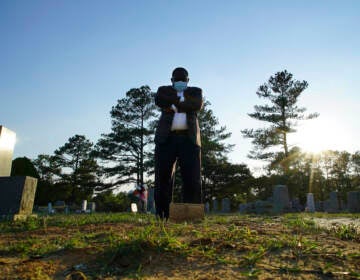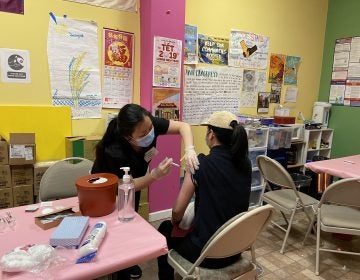Black Doctors Consortium wins city’s first coronavirus testing bid
Tuesday’s announcement represented a change in tune from a few weeks ago, when the Kenney administration expressed hesitancy to fund the group.
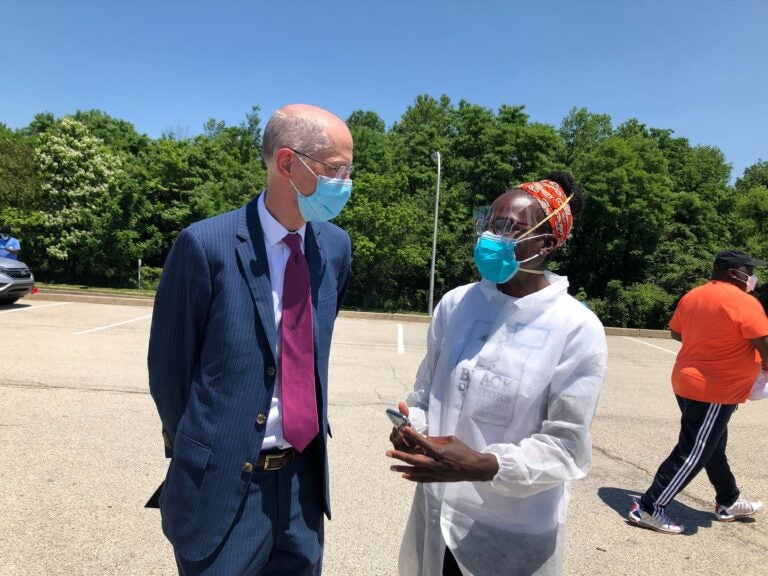
Philadelphia Health Commissioner Thomas Farley speaks with Dr. Ala Stanford, head of the Black Doctors COVID-19 Consortium. (Nina Feldman/WHYY)
Are you on the front lines of the coronavirus? Help us report on the pandemic.
Under a blazing hot sun in the parking lot at Enon Tabernacle Baptist Church in Cedarbrook, Philadelphia officials announced Tuesday that the first major award for coronavirus testing will go to the Black Doctors COVID-19 Consortium. The group started administering tests from church parking lots and street corners in majority African American neighborhoods back in April, when they had to wear hats and scarves — and gloves, of course. Without help from the city, they made it work with volunteer labor, donations and a little federal funding.
“This whole enterprise came from a life of being Black in America and having to wait,” said Ala Stanford, a Montgomery County surgeon who heads the group. “Of people telling you, ‘Be patient. Don’t worry, help is coming.’”
Stanford said that as demographic data was released and showed the virus was disproportionately infecting and killing Black Americans, she didn’t want to wait any longer. So she gathered a crew of fellow health professionals and set out to test the community.
Tuesday’s announcement represented a change in tune from a few weeks ago, when the Kenney administration expressed hesitancy to fund the group.
At the end of May, Stanford and her colleagues put in a $6.9 million bid in response to the city’s request for proposals, soliciting groups that could perform coronavirus tests. The city would dole out the funds from a large federal grant it anticipated receiving: $92 million from the Centers for Disease Control and Prevention, to be spent over 2 ½ years.
But Mayor Jim Kenney came under fire from City Councilmembers when it appeared the city planned to skip over the consortium’s bid in favor of two large organizations with which it already had established relationships. That way, officials said, they could circumvent the lengthy competitive bid process required to secure new vendors and get testing underway quickly.
Health officials clarified that those two organizations, Public Health Management Corp. and Philadelphia Mental Health Care Corp., are not receiving any funds from the CDC grant to conduct testing or contract tracing. Rather, that grant is paying them to help the city hire contract tracers and handle employment and tax paperwork.
Still, it was the optics of extending contracts with large organizations before funding grassroots efforts that comprise and serve the groups hit hardest by the pandemic that riled councilmembers.
“There is never a wrong time to do the right thing,” said Councilmember Cherelle Parker, who had criticized the mayor for appearing to initially pass over the Black Doctors COVID-19 Consortium.
On Tuesday, she thanked him and the health commissioner for essentially putting their money where their mouth is.
“You can’t say Black lives matter if Black organizations don’t have an opportunity to access doing business with the city of Philadelphia,” Parker said.
Though the city would not give an exact dollar figure for the contract being granted, Kenney confirmed the award was in the ballpark of $1 million, with the potential to be renewed after six months, depending on demand. The city’s RFP requires testing groups to recoup insurance reimbursement where possible, and the consortium has collected in-kind and financial donations over the past few months.
According to Stanford, it costs roughly $25,000 a day to conduct 250 to 350 tests. She described the grant amount as “respectable.”
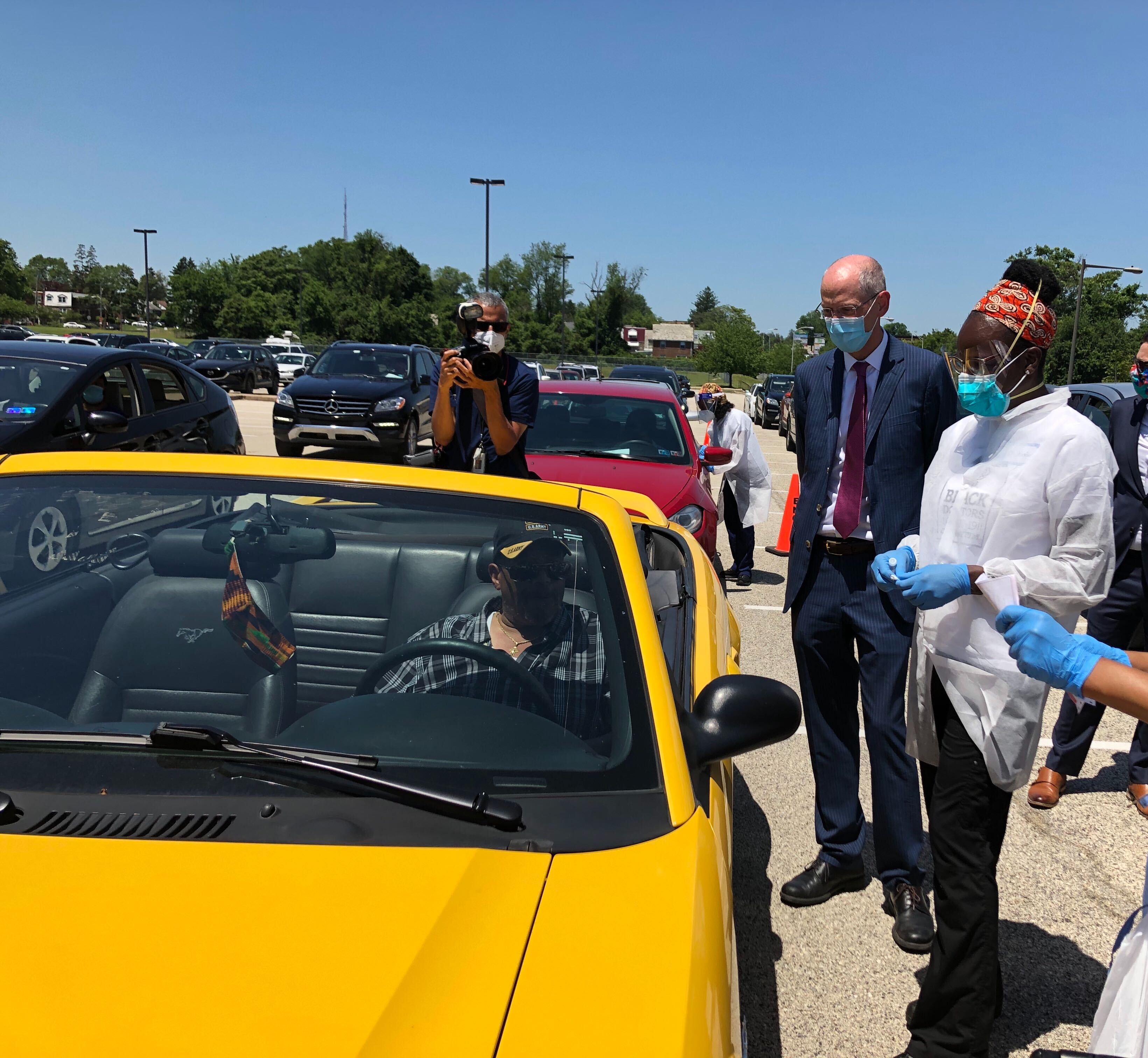
Why the consortium’s efforts succeed
Since April, Stanford said, the consortium has administered more than 5,000 tests over 22 sessions. She said 96% of people being tested by the group are Black.
Health Commissioner Thomas Farley said he expects the relationship to be an ongoing one.
“The epidemic is going to change over time,” he said. “We’re going to be testing for months, maybe years, until we have a vaccine. And when we have a vaccine, we’re going to turn to this group and say, `We need help to get everybody vaccinated.’”
Stanford said she attributes the success of her group to meeting people where they are. She said she’s been on countless Instagram Live videos with kids, “young enough to be her son” to promote getting tested, and that the group has visited public housing and popular hangout spots to spread the word among young African Americans.
Setting up at churches is key to building trust among communities that have historically been skeptical of largely white medical professionals, she added.
“When we go to certain churches, people say, `Oh, this is where I lay my grandmother to rest,’” Stanford said. “Some of our volunteers know everyone in the neighborhood. And they’re like, ‘Oh, you know Sheila’s over there, we gotta go. If Sheila’s there, then it’s OK.”
While the organization may not be as established as some of the other competitive bidders, said Stanford, it has something they don’t: street cred.
“It’s not something we learn in medical school. I’m just gonna be honest with you,” she said.
As the officials concluded their remarks, a steady stream of cars snaked around the church parking lot, lining up for testing. The operation kicked into gear: Nurses donned masks, doctors grabbed swabs, everyone downed bottled water to stay hydrated as the pandemic persisted, into the summer.

Get daily updates from WHYY News!
WHYY is your source for fact-based, in-depth journalism and information. As a nonprofit organization, we rely on financial support from readers like you. Please give today.


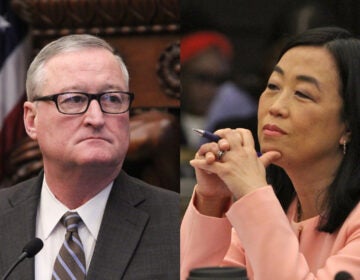
![CoronavirusPandemic_1024x512[1]](https://whyy.org/wp-content/uploads/2020/03/CoronavirusPandemic_1024x5121-300x150.jpg)
